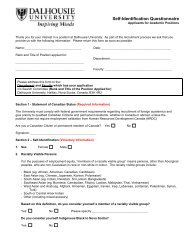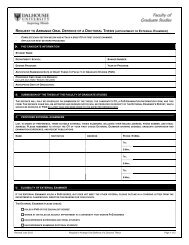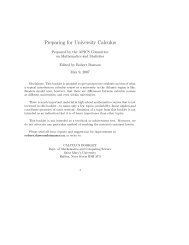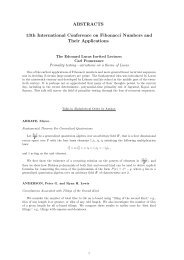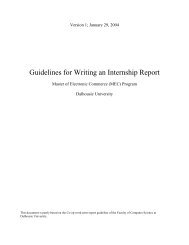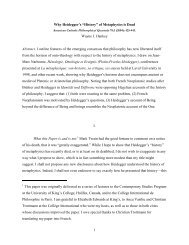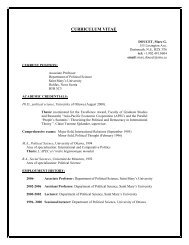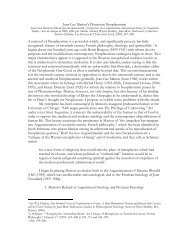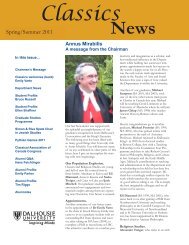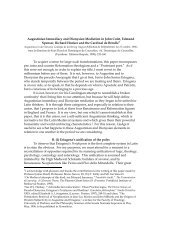Sexual HaRaSSMeNT IS NOT aCCePTaBle - Dalhousie University
Sexual HaRaSSMeNT IS NOT aCCePTaBle - Dalhousie University
Sexual HaRaSSMeNT IS NOT aCCePTaBle - Dalhousie University
You also want an ePaper? Increase the reach of your titles
YUMPU automatically turns print PDFs into web optimized ePapers that Google loves.
If you experience sexual<br />
harassment ...<br />
• Trust yourself – acknowledge what is happening.<br />
• If you are able, tell the person as clearly, firmly<br />
and directly as you can that the behaviour<br />
is unacceptable and that you want it to stop<br />
immediately.<br />
• If you are unable to communicate your concerns<br />
(for fear of reprisal or concerns for your safety<br />
and comfort) OR if you find that saying “no” does<br />
not stop the offensive actions, it is time to seek<br />
help.<br />
• Write down what is happening. Carefully<br />
document the dates, times, places, witnesses<br />
and details of what happened. Keep all<br />
correspondence you have had concerning the<br />
harassment.<br />
• Talk to someone you trust. Someone else may<br />
have experienced a similar problem and sharing<br />
your concerns may make you feel less isolated.<br />
• Place responsibility where it belongs. Someone<br />
else’s behaviour is not your fault or responsibility.<br />
Contact the Harassment Prevention Advisor and/or<br />
the <strong>Sexual</strong> Harassment Resource Group for advice,<br />
information and support. You can reach the Advisor<br />
at 494-1137. Contact information for the <strong>Sexual</strong><br />
Harassment Resource Group members is available<br />
from the Harassment Prevention Advisor or on the<br />
website at hrehp.dal.ca<br />
How you can help to prevent<br />
sexual harassment<br />
• Accept that NO means NO.<br />
• If you are unsure whether your behaviour is<br />
welcome, ask.<br />
• Don’t use or share words, jokes and comments of<br />
a sexual nature that may offend, embarrass, or<br />
hurt others.<br />
• Be aware that cultures different from your own<br />
may interpret actions differently than you do.<br />
• Don’t use power positions to initiate sexual<br />
relationships (even subtly).<br />
• Be aware that the effects of your behaviours may<br />
be harassing to others, even if this was not your<br />
intention.<br />
• Alcohol use does not excuse harassing behaviour.<br />
Drink responsibly.<br />
• Make sure that your attitudes and behaviours<br />
don’t condone harassing behaviours in others.<br />
Contact Numbers<br />
Harassment Prevention Advisor<br />
Gaye Wishart, gaye.wishart@dal.ca<br />
494-1137<br />
Office of Human Rights, Equity and<br />
Harassment Prevention<br />
hrehp.dal.ca<br />
<strong>Dalhousie</strong> Emergency Phone<br />
494-4109<br />
<strong>Sexual</strong><br />
HARASSMENT<br />
<strong>IS</strong> <strong>NOT</strong><br />
ACCEPTABLE<br />
<strong>Sexual</strong> harassment is a form of<br />
discrimination that has a negative<br />
impact on the working and<br />
learning environment.<br />
hrehp.dal.ca
<strong>Dalhousie</strong>’s policy defines sexual<br />
harassment as:<br />
Any sexually‐oriented behaviour of a deliberate or<br />
negligent nature that adversely affects the working<br />
or learning environment. It may involve conduct<br />
or comments that are unintentional as well as<br />
intentional. It includes, but is not limited to:<br />
(1) <strong>Sexual</strong> solicitation or advance of a repeated,<br />
persistent or abusive nature made by a person<br />
who knows, or ought reasonably to know, that<br />
such solicitation or advance is unwanted;<br />
(2) Implied or expressed promise of reward for<br />
complying with a sexually‐oriented suggestion;<br />
(3) Actual reprisal or denial of opportunity, or an<br />
expressed or implied threat of reprisal or denial<br />
of opportunity for a refusal to comply with a<br />
sexually‐oriented suggestion;<br />
(4) <strong>Sexual</strong>ly‐oriented remarks or behaviour on the<br />
part of a person who knows or ought reasonably<br />
to know that such remarks or behaviour may<br />
create a negative psychological or emotional<br />
environment for work, study or participation in a<br />
<strong>University</strong>-related activity or program.<br />
Information on <strong>Dalhousie</strong>’s policy on sexual<br />
harassment is available from members of the <strong>Sexual</strong><br />
Harassment Resource Group and from the Harassment<br />
Prevention Advisor.<br />
The policy is also available on the <strong>University</strong>’s web site<br />
at hrehp.dal.ca<br />
<strong>Sexual</strong> harassment can include:<br />
Verbal:<br />
• <strong>Sexual</strong> innuendo<br />
• Gender-specific insults<br />
• Suggestive or derogatory humour, jokes or<br />
comments emphasizing sex, gender-specific<br />
traits or sexual orientation<br />
• <strong>Sexual</strong> propositions or invitations<br />
• Threats of a sexual nature<br />
• Homophobic remarks<br />
• Inappropriate or uncalled for comments about<br />
one’s body or dress<br />
• Persistent unwanted contact after the end of a<br />
consensual relationship<br />
Non-verbal/non-contact:<br />
• Suggestive staring or leering<br />
• Suggestive and/or derogatory sounds or gestures<br />
emphasizing sex or sexual orientation<br />
• Inappropriate displays or distribution of sexually<br />
suggestive and/or derogatory pictures, objects,<br />
writing or graffiti, including electronic and hard<br />
copy forms<br />
• Unauthorized distribution of sexually- explicit<br />
material involving specific individuals<br />
• Persistent unwanted contact after the end of a<br />
consensual relationship<br />
• Stalking<br />
Physical Contact:<br />
• Unnecessary or unwanted physical contact<br />
of a sexual nature such as patting, touching,<br />
pinching or brushing against a person’s body<br />
• Persistent unwanted physical contact after the<br />
end of a consensual relationship<br />
• <strong>Sexual</strong> assault (acquaintance sexual assault is<br />
more common than assault by a stranger)<br />
<strong>Sexual</strong> harassment is not:<br />
• Interactions between consenting adults<br />
• Mutual attraction or flirtation<br />
• Consensual relationships<br />
• Expressions of affection between friends<br />
Consequences of sexual<br />
harassment<br />
<strong>Sexual</strong> harassment is prohibited by Human Rights<br />
legislation and is not tolerated at <strong>Dalhousie</strong>. Engaging<br />
in sexually harassing behaviours can result in<br />
disciplinary action.<br />
Someone who has been sexually harassed<br />
may experience:<br />
• physical and emotional distress<br />
• disruptions in their personal, academic,<br />
employment and social lives<br />
• withdrawal and/or difficulty interacting with<br />
others<br />
• loss of interest in their area of work or study<br />
• loss of or resignation from their job or<br />
academic program



